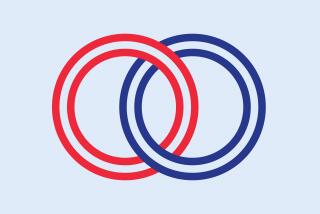Judge Grills Lawyers Arguing for Open Party Primaries
- Share via
SACRAMENTO — State lawyers defending a switch to open primary elections in California, as approved by voters last year, came under intense questioning Friday by a federal judge who will decide whether the change is constitutional.
During oral arguments in a lawsuit brought against open primaries by the state Democratic and Republican parties and some minor parties, U.S. District Judge David F. Levi said his probing remarks should not be interpreted as a signal of what his decision might be. The judge has indicated he may rule by November.
But Levi pressed Deputy Atty. Gen. Cy Rickards to explain the state’s contention that the voters, in effect, spoke as members of the political parties in passing Proposition 198 on the March 1996 ballot.
“You’re trying to say the referendum [Proposition 198] settled the issue,” said Levi. “I have difficulty with you saying the parties have agreed” to change the rules of primary election voting.
The initiative, passed by voters in all 58 counties and by a margin of 59.5% statewide, requires that all registered voters be permitted to vote in any party’s primary election.
Up to now, voters in partisan primaries could only vote for candidates of the party they listed when they registered to vote.
If upheld, Proposition 198 will allow a Democratic voter, for example, to vote for a Republican candidate. Also, independent voters will be able to cast ballots in partisan primaries for the first time.
Both major political parties sued to have Proposition 198 thrown out, saying cross-over voting could lead to “mischief” and “raiding”--voters deliberately voting for weak candidates in an opposing party, thus diluting the rival party’s chances in general elections.
The Democrats’ lawyer, George Waters, argued that, compounding the problem, raiding could take place without detection, unless exit polls were used. Yet in down-ballot races such as contests for state Assembly, where “most of the mischief” would take place, the news media seldom bother with exit polling, he said.
Rickards, representing the state, said an open primary system would make primary voting fairer, allowing independents a voice in the outcome and all voters a chance to vote for their preferred candidate, irrespective of party.
As a result, he said, “candidates will have to pay attention to all the voters” rather than only the party faithful.
And, Rickards said, the voters’ support of Proposition 198 should also persuade Levi to rule in favor of an open primary.
But Levi challenged Rickards’ argument that the major parties have spoken through the majority of their membership who approved Proposition 198.
“You might be satisfied that 60% voted [in favor of the ballot measure] but 40% did not,” Levi said.
“An argument could be made,” the judge said, that for any organization to make a major procedural change, maybe two-thirds or more of the membership should approve.
Nevertheless, said Rickards, the vote and polls showing similar results stand as “evidence” that voters want an open primary.
More to Read
Get the L.A. Times Politics newsletter
Deeply reported insights into legislation, politics and policy from Sacramento, Washington and beyond. In your inbox twice per week.
You may occasionally receive promotional content from the Los Angeles Times.










